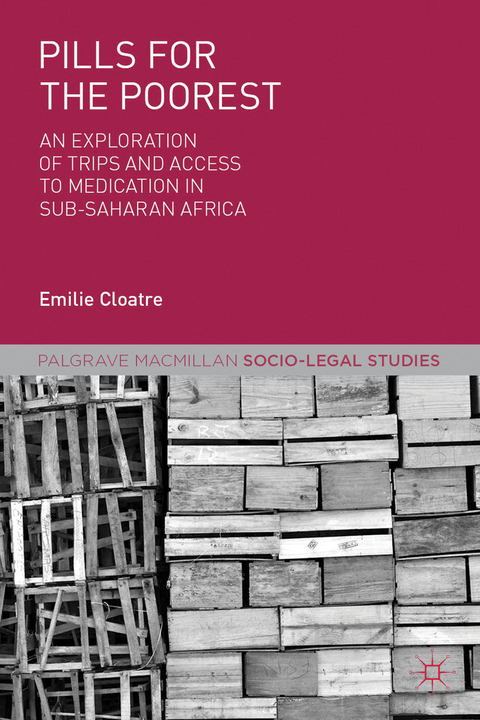
Pills for the Poorest
An Exploration of TRIPS and Access to Medication in Sub-Saharan Africa
Seiten
2013
Palgrave Macmillan (Verlag)
978-0-230-28284-1 (ISBN)
Palgrave Macmillan (Verlag)
978-0-230-28284-1 (ISBN)
The desperate need for a vast part of the global population to access better medicines in more certain ways is one of the biggest concerns of the modern era.
Pills for the Poorest offers a new perspective on the much-debated issue of the links between intellectual property and access to medication. Using ethnographic case studies in Djibouti and Ghana, and insights from actor-network theory, it explores the ways in which TRIPs and pharmaceutical patents are translated in the daily practices of those who purchase, distribute, and use (or fail to use) medicines in sub-Saharan Africa. It suggests that focusing on routine practices and the material deployment of intellectual property significantly enriches our understanding of the complex dynamics that animate the field of access to medicines and helps relocate the role of law within those processes. It demonstrates how intellectual property affects access to medicines in ways that are often discreet, indirect and forgotten. By exploring these complex mechanisms, it seeks to ask questions about the modes of actions of pharmaceutical patents, but also, more generally, about the complexity of legal objects.
Pills for the Poorest offers a new perspective on the much-debated issue of the links between intellectual property and access to medication. Using ethnographic case studies in Djibouti and Ghana, and insights from actor-network theory, it explores the ways in which TRIPs and pharmaceutical patents are translated in the daily practices of those who purchase, distribute, and use (or fail to use) medicines in sub-Saharan Africa. It suggests that focusing on routine practices and the material deployment of intellectual property significantly enriches our understanding of the complex dynamics that animate the field of access to medicines and helps relocate the role of law within those processes. It demonstrates how intellectual property affects access to medicines in ways that are often discreet, indirect and forgotten. By exploring these complex mechanisms, it seeks to ask questions about the modes of actions of pharmaceutical patents, but also, more generally, about the complexity of legal objects.
Emilie Cloatre is a Senior Lecturer at Kent Law School, University of Kent, UK.
Introduction: Global IP and Pills for the Poorest.- 1. TRIPS as Assemblage .- 2. From Global Scripts to Local Translation .- 3. From IP to Public Health in Djibouti and Ghana .- 4. Pharmaceutical Patents as Silent Regulatory Tools: Escaping Branded Drugs in Djibouti .- 5. Ghana, Pharmaceutical Patents and the Ambivalence of Generic Medicines.- 6. Global Movements, Changing Markets and the Reshaping of Health and Disease.- Conclusion: Pharmaceuticals and Socio-Legal Ambivalence.
| Erscheint lt. Verlag | 6.8.2013 |
|---|---|
| Reihe/Serie | Palgrave Socio-Legal Studies | Palgrave Socio-Legal Studies |
| Zusatzinfo | XII, 204 p. |
| Verlagsort | Basingstoke |
| Sprache | englisch |
| Maße | 155 x 235 mm |
| Themenwelt | Studium ► Querschnittsbereiche ► Prävention / Gesundheitsförderung |
| Recht / Steuern ► Allgemeines / Lexika | |
| Recht / Steuern ► EU / Internationales Recht | |
| Sozialwissenschaften ► Soziologie | |
| Wirtschaft | |
| ISBN-10 | 0-230-28284-9 / 0230282849 |
| ISBN-13 | 978-0-230-28284-1 / 9780230282841 |
| Zustand | Neuware |
| Haben Sie eine Frage zum Produkt? |
Mehr entdecken
aus dem Bereich
aus dem Bereich
das Manual zur psychologischen Gesundheitsförderung
Buch | Hardcover (2023)
Springer Berlin (Verlag)
CHF 55,95
Wissenschaftlich basierte Empfehlungen, Tipps und Ernährungspläne für …
Buch (2022)
Thieme (Verlag)
CHF 69,95
Orthomolekulare Medizin in Prävention, Diagnostik und Therapie
Buch | Hardcover (2022)
Thieme (Verlag)
CHF 81,80


